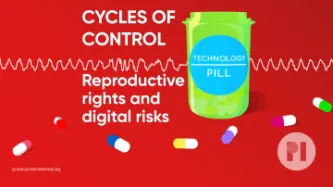Search
Content type: Report
… The rights to a secret vote, privacy, and non-discrimination were undermined in October … Electoral. Key findings The rights to secrecy of the vote, privacy, political participation and non-discrimination were … international treaties and other instruments to which the state is party. We are concerned by the shortcomings of this …
Content type: Advocacy
… of this practice. Advocacy Post date 17th December 2025 Privacy International welcomes the UK House of Lord’s … concerns with tagging, the practice is ineffective at its stated purpose of reducing absconding and maintaining … and the Council of Europe Recommendations to member states on electronic monitoring. The Committee found that …
Content type: Long Read
… legal case. Continue reading Summary of judgment In 2021, Privacy International and others made complaints about … to them because they were operating ‘in furtherance of state functions’. Clearview provides services to a number of … to argue that because what it does was so intertwined with state functions that the two were “effectively merged”, it …
Content type: News & Analysis
… (including the African Union, Commonwealth, League of Arab States, Organisation of American States, European Union and the United Nations, among many … includes guidance on how to monitor the adherence to privacy and data protection standards in the implementation …
Content type: Video
… My name is Gus Hosein and I'm the Executive Director at Privacy International. 00:00:21.45 Caitlin And I'm Caitlin, … company based in the Northwest corner of the United States of America called Microsoft. They're so small that … shot it repeatedly. Christopher Yeah, taken it to a farm upstate, which is actually a little bit of a misnomer because …
Content type: Long Read
… of strategic advantage, deterrence, and national security. States and corporations alike are turning to technology … while quietly profiting from defence contracts and state partnerships. Others are newer players, already born … This dynamic not only undermines democratic freedoms and privacy but also fuels a global tech race that prioritises …
Content type: Report
… A convergence of corporate interests and state power, blurring boundaries between civil and … providing the potential for a horrific escalation of state power. An avid gamer, its founder, Palmer Luckey, made … AI training purposes, there are also grave concerns for the privacy implications of Anduril’s tech. In the case of the …
Content type: Long Read
… cards aim to provoke discussions around the importance of privacy during the election cycle. ♥ Hearts: Why does data … proliferate. ♥ National laws should recognise the right to privacy, including the protection of personal data. These … susceptible to data exploitation and privacy violations. ♦ States are increasingly employing technologies to coordinate …
Content type: Long Read
… databases, and analytics tools, managed by both the state and private companies, for AI, surveillance, and more. … for Education . Source: Defend Digital Me report, the State of Data (2020) In UK state schools, at the centre of … law is generally permissive and rarely protects children’s privacy in educational settings. Digital pupil records and …
Content type: Video
… Era of Militarisation of Tech “Killer Robots”: Read PI's statement during informal consultations on autonomous … Gus My name is Gus Hosein and I'm the Executive Director at Privacy International. Caitlin And I'm Caitlin and I'm PI's … at PI for the past seven years, primarily focusing on state accountability for surveillance practices. And I'm …
Content type: Advocacy
… Privacy International and global allies present their … platform workers. Digital labour platforms and member states must be legally obliged to adopt and implement clear … the analysis above, we have together produced a joint statement to highlight how the Convention and Recommendation …
Content type: Long Read
… This article summarises Privacy International's view on why a rights based approach … framework that puts human rights and corresponding state obligations at the heart of policy. It can be used as … both that people are involved and engaged, and that states are adequately resourced, are necessary to prevent …
Content type: News & Analysis
… order may be just as big a threat to worldwide security and privacy as the old one. The status of the original order … The resulting vulnerability can be exploited by hostile states, criminals and other bad actors the world over. The … in a world where security risks are mounting every day. Privacy International and Liberty's legal challenge to the …
Content type: Long Read
… as we warn now: industry has to answer for itself which state security services it would be prepared to work for. … Terms of Service by storing surveillance data. Microsoft states that their Terms of Service “prohibit the use of our … its relationship with Israel over its commitments to privacy and human rights. What we also know: it’s an …
Content type: Long Read
… In light of this, we conducted research to see how other states and jurisdictions are regulating biometric … individuals from the grave risks they pose to human rights. States rely more and more on this technology for public mass … of FRT. To this end we launched our campaign, the ' End of Privacy in Public ', to inform the public and …
Content type: Long Read
… data-intensive and militarised, which threatens our privacy, dignity, and autonomy . The spread of these systems … is vital for ensuring that the military serves the state and its citizens, rather than becoming a political … stakeholders involved in ensuring compliance by both state and private actors with existing regulations, need to …
Content type: Long Read
… blurs legal boundaries, creating critical gaps in privacy and accountability protections. Long Read Post date … peace, but to all contexts. It attributes responsibility to states and other actors to respect, protect and fulfill … by the Militarisation of Tech is the increasing reliance of states on companies that develop advanced technologies for …
Content type: Long Read
… the ARPANET. Now we are witnessing a significant shift: states and corporations are harnessing technology to advance … in everyday governance with long-term consequences for privacy and human rights. Today, we are witnessing a similar … to national security to fail? Too intertwined with the state to be held accountable? War Reshaping of Our Town …
Content type: Long Read
… indicating that front companies operated by the Russian state regularly purchased Pléiades satellite imagery , used … and military data has serious implications for our right to privacy and our societies. This Is The Era of Militarisation … contexts of conflict, which has serious implications for privacy and beyond. It also leads to the maximisation of …
Content type: Long Read
… This is the next great challenge for the protection of privacy, autonomy and dignity . Data Revolution in War … manage and maintain more and more of the functions of the state. With the rush to develop AI models, these firms with … domestic governance begins to collapse. This ‘securitised state’ no longer responds only to identifiable threats, but …
Content type: Advocacy
… , we recommended the UN Special Rapporteur to call on states to: Conduct human rights due diligence, including … stakeholders must consistently assess whether the use of privacy-intrusive technologies is necessary and if less … to the right to education and may undermine students' privacy and security. The Report of the Special Rapporteur …
Content type: Examples
… have access to reams of private data that could result in privacy and security violations, a new study has found. 25 … and Remind, request permissions to read the phone state, which can include a device's phone number, SIM card …
Content type: Long Read
… without sufficient safeguards to protect the right to privacy and meet data protection standards. Migrants appear … without sufficient safeguards to protect the right to privacy and meet data protection standards. This raises … tool to generate their decisions. In our assessment, the stated objectives fail to justify the collection and use of …
Content type: Video
… Gus My name is Gus Hosein and I'm the executive director at Privacy International and I am happy to solicit any comments … is a lot harder to break, we use the coercive power of the state. 00:36:35.87 Maria And one of those is competition. … use, like, in, while we still have decent social democratic states in many parts of the world, like, 00:36:48.84 Maria …
Content type: News & Analysis
… action, claiming it is an “historic breach of the right to privacy”. Former minister Sir David Davis MP says “It’s … how and why searches can be undertaken. The Home Office stated in legal correspondence that they are working toward … databases, and the EU Settlement Scheme. Campaigners have stated that the giant databases have been turned into …
Content type: News & Analysis
… The move to AI assistants and agents risks a sea change in privacy and security. We analyse OpenAI's early claims that … that you have logged it into via takeover mode.” The firm states that it has taken steps against prompt injection (and … machine on OpenAI’s servers. But ultimately the firm states that the tradeoffs are left to the user, when …
Content type: Video
… report form Adriana Smith's case More about Adriana's case Privacy International's Menstruation apps research Research … account restrictions An report by the Independent on state funding for 'fake' clinics Women on Web report about … the Dobbs decision, which meant that you know individual states within the US could bring in their own bans on …
Content type: Advocacy
… 9th July 2025 Credit: Siavosh Hosseini On 10 March 2025, Privacy International (PI) attended the 32nd Session of the … urge the EU and its institutions to: 1. Ensure members states uphold and enforce the EU GDPR; 2. Ensure member states fulfill and enforce the obligations stipulated in the …
Content type: Guide step
… backup settings This is a key setting to look into. Viber states that is is end to end encrypted , which means that … a new device. This setting is a potential threat to your privacy as anyone that would potentially get access to your … on the bottom right corner of the screen Tap Settings > Privacy Viber Privacy Settings In case you are using Viber …
Content type: Video
… work on Securitising Education 25 Years old - The Database State report 5 safes principles UK Government's publication … awareness in people like me who knew nothing about how the state would collect information and personal data about all … which will have a whole new myriad of questions around privacy and and data sharing. 43:05.39 Jen But the idea is …




























